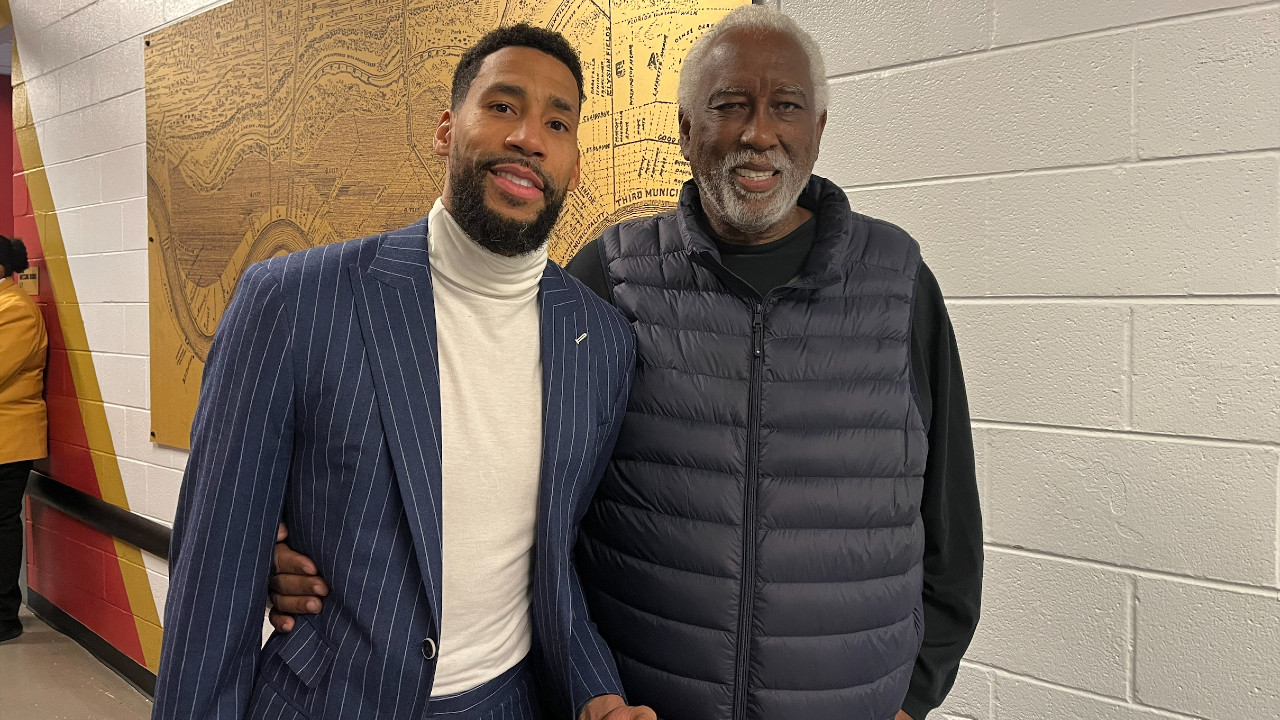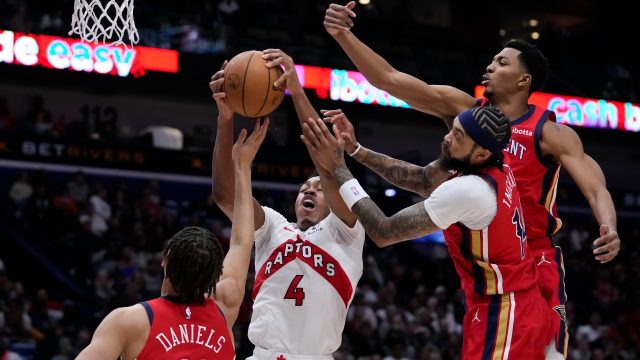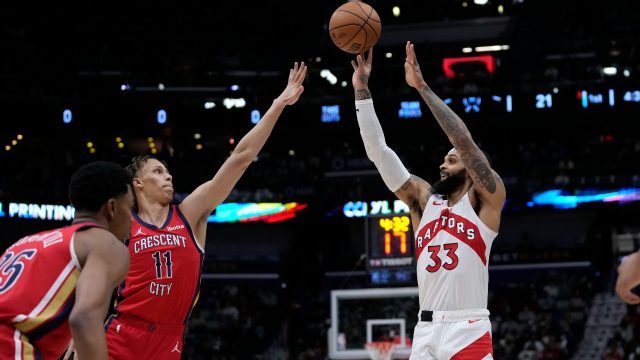
NEW ORLEANS — ‘Every NBA player has a story’ is an expression you hear if you’re around the league long enough.
Well, of course. It’s indisputable because everyone not in the NBA has a story, too. But when layered over the reality that the league is the workplace of the 450 best basketball players in the world, it takes on added meaning. By definition, making the league is exceptional, and rare, and rare exceptional things make for good stories.
Take Garrett Temple, for example.
He hasn’t been front-and-centre in the Raptors conversation too often this season. He played in just his 15th game on Monday night, soaking up minutes in a 138-100 blowout loss to the New Orleans Pelicans in a game that was decided by halftime, if not earlier. The Raptors were going to be in tough missing RJ Barrett (knee), losing Gary Trent Jr. (back) at half time and playing on the second night of a back-to-back after a loss in double-overtime in Oklahoma City on Sunday night. Not that Raptors head coach Darko Rajakovic was buying any of that.
“We don’t look for excuses. That’s not how we want to build. That’s not how I’m built,” said Rajakovic, clearly upset at his team’s level of play. “As I said, we have a job, and we have a privilege to have this job — to play and perform in the NBA. When 7 p.m. is there, you’ve got to be ready. And we just did not do a good job tonight in that area.”
With the Raptors trailing by 34 after three quarters, Temple ended up playing the entire fourth quarter in front of friends and family and his 12 minutes and five points were both season highs.
But at age 37 and in his 14th season, Temple’s most important work has been done off the floor or on the practice court. In that regard, he has a lot to offer. Rookie Gradey Dick understandably didn’t want to get too carried away talking about the career-high 22 points he scored against New Orleans in a blowout loss, the Raptors’ one glimmer of light on the night.
But ask him about how Temple has helped him navigate the 20-year-old’s topsy-turvy season and Dick’s eyes light up.
“Garrett’s amazing, he always is,” said Dick who shot 7-of-12 from the floor in 21 minutes. “I can’t say he’s the best vet I’ve ever had because I’ve only had one, but he’s got to be, you know, the best vet out there, in terms of caring about me, not only as a basketball player, but as a person … it’s a long season and you’re going to have your ups and downs, but when you get in your downs, I always have someone to go to and talk my way out of it with him.”
Temple’s basketball journey and ties to Louisiana and New Orleans make him a fount of living history.
As an example, a few years ago the Toronto Raptors wing participated in a public service spot for the National Basketball Players Association to commemorate Black History Month.
Temple had a lot of material to draw on. It’s not uncommon for an athlete who makes the NBA to be a prominent figure in their hometown, but in Temple’s case, he’s a big name in the state of Louisiana and not simply for what he’s accomplished on the floor.
Sure, he’s the all-time leader at Louisiana State University in games played and helped take the Tigers to the Final Four in 2006. And sure he’s the LSU alumni with the most NBA service time behind only Shaquille O’Neill. And sure he played two productive seasons with the Pelicans before joining the Raptors.
But Temple will be the first to say — and will do so with considerable pride — that the roots of his story long pre-date his own accomplishments. The NBA has always been a place where race, history and culture intersect, but Temple’s experience stands apart, in some ways. He knows it and is proud of it.
“I think just in general, as human beings we appreciate things more the older we get, because we just have a little more wisdom we learn a little bit more,” he says. “I knew what was going on at a young age. I understood what my dad went through. What my grandpa went through the legacy piece, [my Dad]was really big on talking to us about that; not being overbearing about it but letting us know and understand that we’re really big on family and history.”
It’s a history where the battles and scars from segregation and institutional racism are all too real.
His grandfather, Collis B. Temple Sr. had to get his advanced degree in agricultural economics from Michigan State because in 1955 LSU rejected him from their Master’s program, because they didn’t accept Black students at the time. Thurgood Marshall — not yet on the U.S. Supreme Court — tried to recruit Temple’s grandfather to a class-action suit against state schools that were denying entrance to students on the basis of race. Rather than bow to the pressure, the state legislature provided a grant to cover Temple Sr.’s costs to attend an out-of-state school. So Temple Sr. went north to East Lansing, got his degree, and returned to Louisiana to start his career as an educator and administrator. Along the way, he married Temple’s grandmother, Shirley, who was taught biology by George Washington Carver at the Tuskegee Institute.
History follows some people.
But the Temples’ march through Black history was just beginning.
Garrett’s father, Collis Temple Jr., emerged as one of the best athletes in the state in the late 1960s, excelling in both basketball and football. In 1971, the governor of Louisiana personally recruited Collis Jr. to become the first Black basketball player at LSU — the same school that had denied his father an education. In a family decision, Collis Jr. decided to accept the opportunity to be a trailblazer and, despite some trying times (there is a story of him debating infamous white supremacist David Duke one afternoon on campus) and being the only Black player on the team for all four years, he ended up as team captain, eventually playing a season of professional basketball with the San Antonio Spurs in the old ABA. He stayed in Baton Rouge and has been a fixture in Louisiana basketball circles and LSU circles ever since.
It’s quite a legacy to live up to, and Garrett Temple has always been aware of it.
“I definitely understood that there was something (important there) and then obviously the older you get, and to see my dad get on the [LSU] board of supervisors, with what his dad went through what he went through, to be able to name the first Black president of SEC University, I’m getting chills talking about it,” said Temple. “And that’s really important. Legacy type stuff. Definitely appreciated. The Temple name wasn’t just a name.”
In basketball terms, Temple has had his own struggles, at least by NBA standards. He wasn’t drafted out of LSU after four seasons and didn’t get his first regular gig in the NBA until three years after he graduated, building up a lengthy list of G-League, Summer League and 10-day assignments along the way.
But Temple made his itinerant NBA lifestyle work for him. He had always played the way he needed to play to stay in the NBA — as a facilitator and defender who understood his job was to make life easier for the team’s stars and keep the locker room running smoothly. Gathering those experiences and relationships as he travelled helped make him a sought-after role player, even now in his 14th season.
Along the way, he still found time to marry Miss USA, Kara McCullough, a nuclear scientist who was working as an emergency preparedness specialist in Washington D.C. before they met.
In New Orleans, Temple moves like royalty. He couldn’t take two steps after the game at Smoothie King Arena without stopping to catch up with an old friend or familiar face. He remains revered within the Pelicans organization, who only let him go this season because of a roster crunch.
“He was just in our workout room just a little bit ago with all the guys. Garrett was great for us,” said Pelicans coach Willie Green. “… Especially with me being a first-year head coach, leaning on him on concepts and how you like practice time and what do you think about team dinners and just doing different things … there’s a reason that he’s having a great career and a long career: high character, and he continues to work hard. And he’s bringing all of that to Toronto.”
Do you know how good a veteran Temple is?
He’s a mentor to 17-year veteran Thad Young, who suited up for his 1,161st game last night, third among active players and 61st all-time.
“Then young guys can look up to him for how to carry themselves, but we talk a lot, we’ve been good friends for a while, so we have a lot of in-depth conversations about the team, but also family, business, everything,” said Young, who previously played with Temple in Chicago. “It’s really good having him as a teammate. He’s a guy that, when things are tough on me, I can definitely lean on him, because he’s definitely been through these experiences, just like me.”
It will be interesting to see how many years Temple will be able to bring his particular brand of wisdom to NBA locker rooms. If he has his way, he’ll keep going. History doesn’t stop.
“Physically I can still do it, for sure, definitely man,” says Temple, a long-jumper and triple-jumper in high school who can still rise up when the occasion calls for it. “And mentally I do. It’s just a matter of whether Bobby and Masai (Raptors general manager and president Bobby Webster and Masai Ujiri) are going to hook me up. I know people around the team understand how important veterans are, and I think teams (across the league) do honestly. But at the end of the day, it’s still a numbers game, and I learned that part of the business in my first year.”
But whether Temple is at the mid-point of his final year or if he’s got more to play, he’s made his mark. He’s been active in the players’ union executive for years, helping usher in a new Collective Bargaining Agreement this past summer. He’s helped lead conversations around police brutality; when he was playing in Sacramento the community was rocked by the police shooting of Stephon Clark. He used his voice again during the summer of 2020 as the NBA struggled with its social justice responsibilities and how to return to play in the midst of the pandemic, and in the wake of the murder of George Floyd by police in Minneapolis.
Whether Monday night was his last visit home to Louisiana as an active NBA player or not, Temple is proud of how he’s carried his family’s name and legacy, on an off the floor.
“I feel like I have (lived up to it),” he said. “I was never really pegged as a guy who was going to be in the NBA for a long time coming out. A lot of people looked at me as Collis Temple’s son, ‘He’s pretty good but a lot of what he gets is because of who his Dad is’ … but my dad can’t talk to a GM about getting you on a team, you know what I’m saying? I definitely hold my career high. I’m proud of what I’ve been able to do in this position and I cherish it maybe a little more than other people.”
One of the last people Temple greets in the hallway outside the Raptors locker room Monday night was his Dad, Collis Jr.
A living part of Louisiana’s athletic history, he coached his youngest son all the way up and delivered him to his alma mater and has looked on proudly as his son built his own legacy at LSU and carved out a career in the NBA few would have predicted.
“Garrett is a fine, fine, young man,” his Dad says, approvingly. “He’s done very, very well. He’s been a tremendous son, a tremendous basketball advocate and he does everything the right way and he’s been like that since he was a youngster. Now he’s getting to be an old man and into the winter of his basketball career and I’m sure he’s going to be moving on and doing bigger and better things.”
Garrett Temple’s story and his family’s legacy are still being written.








